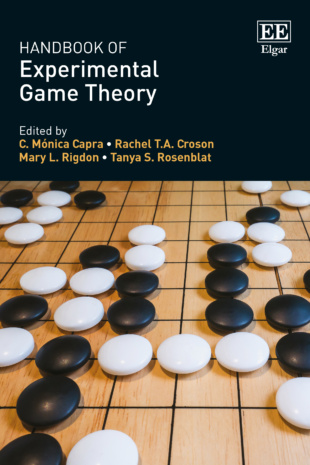The aim of this Handbook is twofold: to educate and to inspire. It is meant for researchers and graduate students who are interested in taking a data-based and behavioral approach to the study of game theory. Educators and students of economics will find the Handbook useful as a companion book to conventional upper-level game theory textbooks, enabling them to compare and contrast actual behavior with theoretical predictions. Researchers and non-specialists will find valuable examples of laboratory and field experiments that test game theoretic propositions and suggest new ways of modeling strategic behavior. Chapters are organized into several sections; each section concludes with an inspirational chapter, offering suggestions on new directions and cutting-edge topics of research in experimental game theory.
Handbook of Experimental Game Theory
C. Mónica Capra, Rachel T.A. Croson, Mary L. Rigdon, and Tanya S. Rosenblat (Editors)


